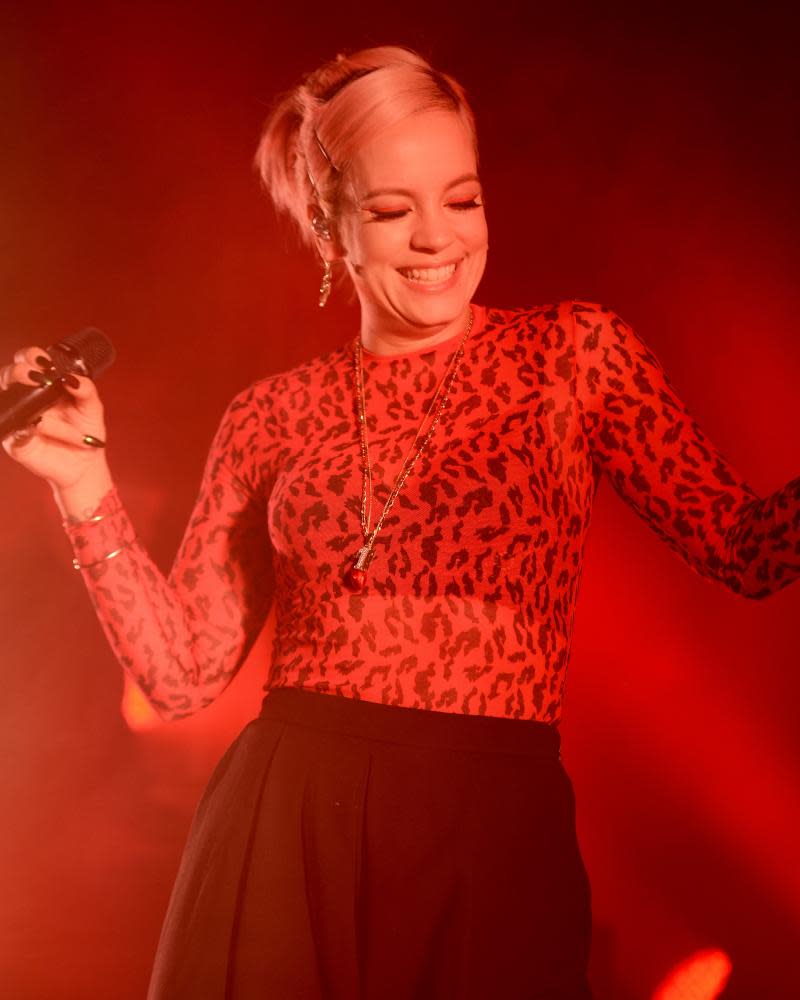Lily Allen review – confessional pop on her own terms

Notable by its absence from the second of Lily Allen’s intimate comeback shows is any trace of the 32-year-old’s last album, from 2014. It’s not surprising: Sheezus bombed critically, sank commercially and, thanks to a video interpreted as racist and anti-feminist, became a lamb to the slaughter in the early days of Twitter’s wokeness wars. Nobody wants to go back there. To boot, the material she debuts from her forthcoming fourth album, No Shame, couldn’t be further from its predecessor’s hostile defensive posturing.
Fans know to expect candour from Allen, who pioneered colloquial urban pop in the mid-2000s, and spends either an admirable or worrying amount of time explaining herself to trolls. There’s a sense of someone with a yearning to be understood. Covering the breakdown of her marriage, her depression, loneliness and fears about her children, Allen has apparently concluded on No Shame that the best way to show people they know nothing about her isn’t to satirise their preconceptions, but to tell her truth in unflattering, uncomfortable, accountable detail.
It makes the Dome show high-stakes, which Allen defuses with a low-key setup, just her and two producers. Given her sometimes embattled persona, it’s easy to forget how sweet and nimble her voice is. While her mockney twang was key to her spiky first two albums, the arrangements of her new material – contemporary, minimal dance-pop that references Drake, Jamie xx and dancehall – complement her tone, which in turn sets her dark revelations into even starker relief.

“I feel it in my blood, I’m gonna let you fuck me,” she sings on Everything to Feel Something, a gorgeous, anaesthetised R&B song. Apples traces the quick progression of her relationship from marriage to kids, then punctures it: “And now I’m exactly where I didn’t want to be,” she sings, practically a capella. There’s none of her trademark wordplay, her writing having sharpened in other ways. The lullaby-like Three is a clever perspective-flip that would be saccharine if it weren’t so well drawn, observing Allen’s life through the eyes of her young daughters – though her acid tongue is still in working order. “Everyone thinks I’m being sentimental,” she says afterwards, “but actually I’m just gunning for a mobile phone contract.” Her way with a punchline comes through on Lost My Mind, which confronts the paradox behind the gossip mill: “Everyone’s on record saying that they know me, so why am I so lonely ’cos nobody fucking phones me?” It punches the air, then the gut.
Some of the more upbeat new songs aren’t quite as effective. Cake hammers the refrain “have your cake and eat it”, and two songs about her new boyfriend don’t have the bite of the sad stuff nor the insouciance of the classics. But hearing Knock ’Em Out, Smile and The Fear in 2018 makes you realise how ahead of her time Allen was, pulling from soundsystem culture and grime in the mid-2000s. Giggs’s feature on comeback single Trigger Bang makes sense, and when the rapper makes a surprise appearance during the encore, the clear affection between them is lovely.
Afterwards, she cries. A lot rides on this comeback, and as introspective as the new lyrics are, the sound suggests an artist with her ear to the ground for the first time in a while: listening, letting her guard down, hoping people meet her on her terms. They should: it’s 12 years since Allen opened the floodgates for bold British female solo artists, but even now few can match her fearlessness.

 Yahoo News
Yahoo News 
